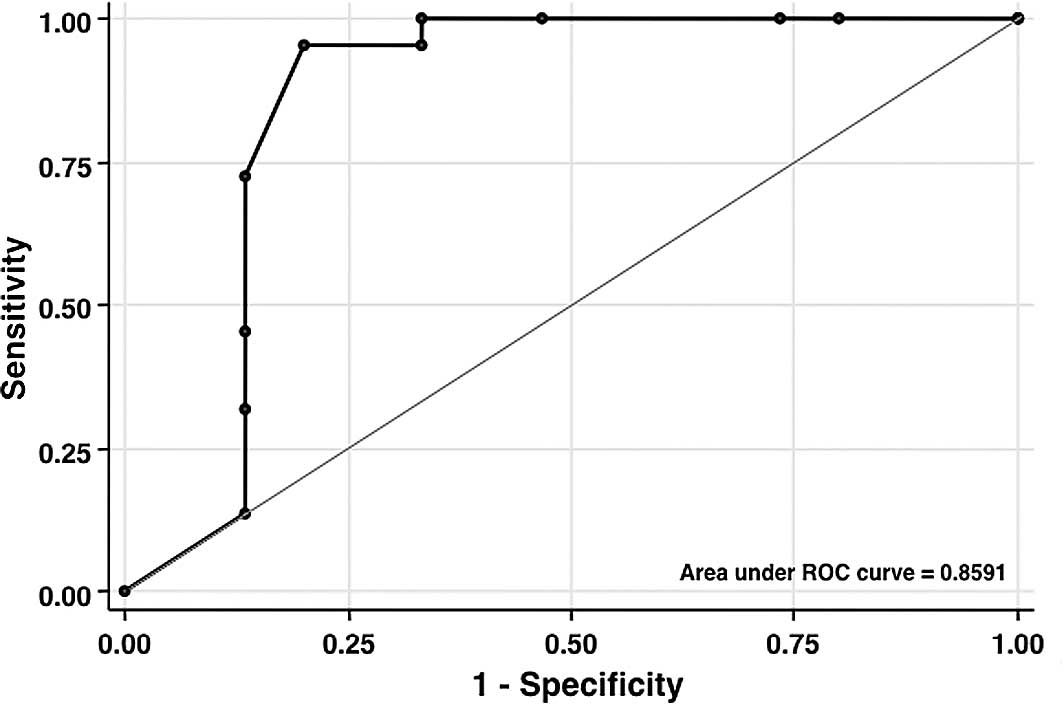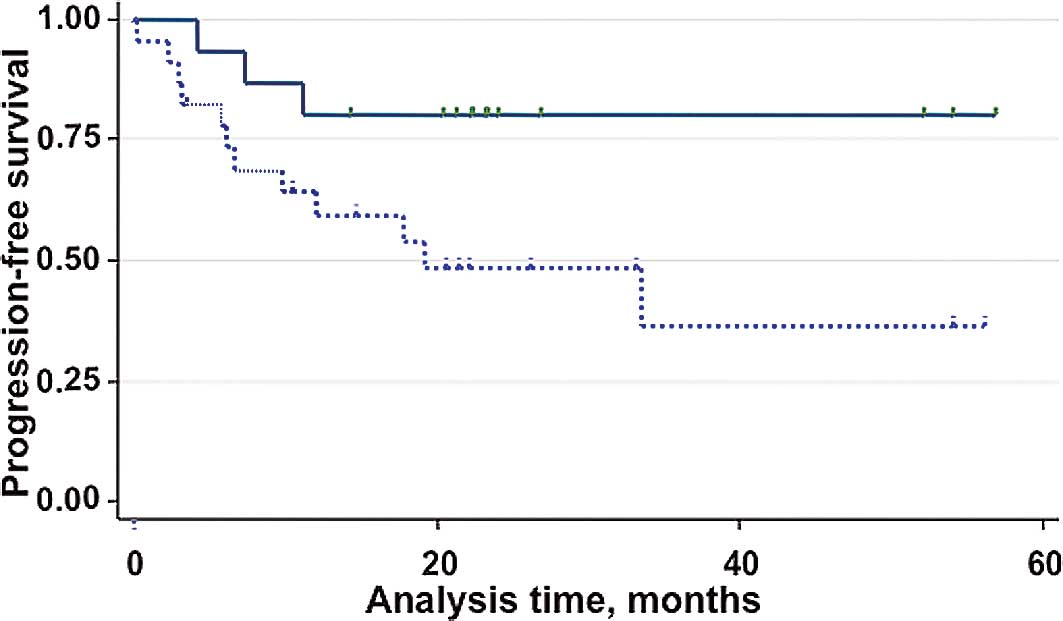|
1.
|
Armstrong D, Bundy B, Wenzel L, Huang H,
Baergen R, Lele S, Copeland L, Walker J and Burger R; for the
Gynecologic Oncology Group: Intraperitoneal cisplatin and
paclitaxel in ovarian cancer. N Engl J Med. 354:34–43. 2006.
View Article : Google Scholar : PubMed/NCBI
|
|
2.
|
Katsumata N, Yasuda M, Takahashi F,
Isonishi S, Jobo T, Aoki D, Tsuda H, Sugiyama T, Kodama S, Kimura
E, Ochiai K and Noda K; for the Japanese Gynecologic Oncology
Group: Dose-dense paclitaxel once a week in combination with
carboplatin every 3 weeks for advanced ovarian cancer; a phase III,
open-label, randomized controlled trial. Lancet. 374:1331–1338.
2009. View Article : Google Scholar
|
|
3.
|
Saitou M, Isonishi S, Hamada T, Kiyokawa
T, Tachibana T, Ishikawa H and Yasuda M: Mitochondrial
ultrastructure associated chemotherapy response in ovarian cancer.
Oncol Rep. 21:199–204. 2008.PubMed/NCBI
|
|
4.
|
Hirama M, Isonishi S, Yasuda M and
Ishikawa H: Characterization of mitochondria in cisplatin-resistant
human ovarian carcinoma cells. Oncol Rep. 16:997–1002.
2006.PubMed/NCBI
|
|
5.
|
Isonishi S, Saitou M, Ochiai K, Yasuda M
and Tanaka T: Enhancement of sensitivity to cisplatin by orobol is
associated with increased mitochondrial cytochrome c release in
human ovarian carcinoma cells. Gynecol Oncol. 90:413–420. 2003.
View Article : Google Scholar
|
|
6.
|
Kim TS, Yun BY and Kim IY: Induction of
the mitochondrial permeability transition by selenium compounds
mediated by oxidation of the protein thiol groups and generation of
the superoxide. Biochem Pharmacol. 66:2301–2311. 2003. View Article : Google Scholar
|
|
7.
|
Chilin A, Dodoni G, Frezza C, Guiotto A,
Barbieri V, Di Lisa F and Canton M:
4-Hydroxymethyl-1,6,8-trimethylfuro [2,3-h] quinolin-2(1H)-one
induces mitochondrial dysfunction and apoptosis upon its
intracellular oxidation. J Med Chem. 48:192–199. 2005.
|
|
8.
|
Ferlini C, Raspaglio G, Mozzetti S,
Distefano M, Filippetti F, Martinelli E, Ferrandina G, Gallo D,
Ranelletti FO and Scambia G: Bcl-2 down-regulation is a novel
mechanism of paclitaxel resistance. Mol Pharmacol. 64:51–58. 2003.
View Article : Google Scholar : PubMed/NCBI
|
|
9.
|
Shajahan AN, Wang A, Decker M, Minshall
RD, Liu MC and Clarke R: Caveolin-1 tyrosine phosphorylation
enhances paclitaxel-mediated cytotoxicity. J Biol Chem.
282:5934–5943. 2007. View Article : Google Scholar : PubMed/NCBI
|
|
10.
|
Flatters SJ and Bennett GJ: Studies of
peripheral sensory nerves in paclitaxel-induced painful peripheral
neuropathy: evidence for mitochondrial dysfunction. Pain.
122:245–257. 2006. View Article : Google Scholar
|
|
11.
|
Liu L, Vo A, Liu G and McKeehan WL:
Distinct structural domains within C19ORF5 support association with
stabilized microtubules and mitochondrial aggregation and genome
destruction. Cancer Res. 65:4191–4201. 2005. View Article : Google Scholar
|
|
12.
|
André N, Carré M, Brasseur G, Pourroy B,
Kovacic H, Briand C and Braguer D: Paclitaxel targets mitochondria
upstream of caspase activation in intact human neuroblastoma cells.
FEBS Lett. 532:256–260. 2002.PubMed/NCBI
|
|
13.
|
Matassa AA, Carpenter L, Biden TJ,
Humphries MJ and Reyland ME: PKC delta is required for
mitochondrial-dependent apoptosis in salivary epithelial cells. J
Biol Chem. 276:29719–29728. 2001. View Article : Google Scholar : PubMed/NCBI
|
|
14.
|
Grivicich I, Regner A, da Rocha AB, Grass
LB, Alves PA, Kayser GB, Schwartsmann G and Henriques JA:
Irinotecan/5-fluorouracil combination induces alterations in
mitochondrial membrane potential and caspases on colon cancer cell
lines. Oncol Res. 5:385–392. 2005.
|
|
15.
|
Silverberg SG: Histopathologic grading of
ovarian carcinoma: a review and proposal. Intl J Gynecol Pathol.
19:7–15. 2000. View Article : Google Scholar : PubMed/NCBI
|
|
16.
|
Malpica A, Deavers MT, Tornos C, Kurman
RJ, Soslow R, Seidman JD, Munsell MF, Gaertner E, Frishberg D and
Silva EG: Interobserver and intraobserver variability of a two-tier
system for grading ovarian serous carcinoma. Am J Surg Pathol.
31:1168–1174. 2007. View Article : Google Scholar : PubMed/NCBI
|
|
17.
|
Malpica A, Deavers MT, Lu K, Bodurka DC,
Atkinson EN, Gershenson DM and Silva EG: Grading ovarian serous
carcinoma using a two-tier system. Am J Surg Pathol. 28:496–504.
2004. View Article : Google Scholar : PubMed/NCBI
|
|
18.
|
Mc Cluggage WG, Lyness RW, Atkinson RJ,
Dobbs SP, Harley I, Mc Clelland HR and Price JH: Morphological
effects of chemotherapy on ovarian carcinoma. J Clin Pathol.
55:27–31. 2002.
|
|
19.
|
Benda JA and Zaino R: GOG Pathology
Manual. Gynecologic Oncology Group; Buffalo, NY: 1994
|
|
20.
|
Therasse P, Arbuck SG, Eisenhauer EA,
Wanders J, Kaplan RS, Rubinstein L, Verweij J, van Glabbeke M, van
Oosterom AT, Christian MC and Gwyther SG: New guidelines to
evaluate the response to treatment in solid tumors. European
Organization for Research and Treatment of Cancer, National Cancer
Institute of the United States, National Cancer Institute of
Canada. J Natl Cancer Inst. 92:205–216. 2000. View Article : Google Scholar
|
|
21.
|
Rustin GJ: Use of CA-125 to assess
response to new agents in ovarian cancer trials. J Clin Oncol.
21:S187–S193. 2003. View Article : Google Scholar : PubMed/NCBI
|
|
22.
|
Ishikawa T, Zhu BL and Maeda H: Effects of
therapeutic agents on cellular respiration as an indication of
metabolic activity. Hum Exp Toxicol. 25:135–140. 2006. View Article : Google Scholar : PubMed/NCBI
|
|
23.
|
Amano Y, Okumura C, Yoshida M, Katayama H,
Unten S, Arai J, Tagawa T, Hoshina S and Ishikawa H: Measuring
respiration of cultured cell with oxygen electrode as a metabolic
indicator for drug screening. Human Cell. 12:3–10. 1999.PubMed/NCBI
|
|
24.
|
Disaida PJ, Sinkovics JG, Rutledge FN and
Smith JP: Cell-mediated immunity to human malignant cells. Am J
Obstet Gynecol. 114:979–989. 1972.PubMed/NCBI
|
|
25.
|
Andrews PA, Murphy MP and Howell SB:
Differential potentiation of alkylating agent cytotoxicity in human
ovarian carcinoma cells by glutathione depletion. Cancer Res.
45:6250–6253. 1985.
|
|
26.
|
Parmar MKB and Machin D: Survival
Analysis: A Practical Approach. John Wiley & Sons Inc.; New
York: pp. 160–177. 1995
|
|
27.
|
Andreotti PE, Cree IA, Kurbacher CM,
Hartmann DM, Linder D, Harel G, Gleiberman I, Caruso PA, Ricks SH,
Untch M, Sartori C and Bruckner HW: Chemosensitivity testing of
human tumors using a microplate adenosine triphosphate luminescence
assay. Clinical correlation for cisplatin resistance of ovarian
carcinoma. Cancer Res. 55:5276–5282. 1995.
|
|
28.
|
Brown E and Markman M: Tumor
chemosensitivity and chemoresistance assays. Cancer. 72:1020–1025.
1996. View Article : Google Scholar
|
|
29.
|
Tate Thigpen J: Debate; therapy for a
patient with platinum-resistant/refractory recurrent ovarian cancer
should be selected based on results of an in vitro drug
sensitivity/resistance assay. Clin Ovarian Cancer. 1:96–110.
2008.
|
|
30.
|
Markman M, Blessing JA, DeGeest K, Morgan
M, Look KY, Herzog TJ and Rose PG: Lack of efficacy of 24-hour
infusional topotecan in platinum-refractory ovarian cancer; a
Gynecologic Oncology Group trial. Gynecol Oncol. 75:444–446. 1999.
View Article : Google Scholar : PubMed/NCBI
|
|
31.
|
Brewer C, Blessing J, Nagourney R, Morgan
M and Hanjani P: Cisplatin plus gemcitabine in platinum-refractory
ovarian or primary peritoneal cancer; a phase II study of the
Gynecologic Oncology Group. Gynecol Oncol. 103:446–450. 2006.
View Article : Google Scholar : PubMed/NCBI
|
|
32.
|
Markman M, Blessing J, Rubin SC, Connor J,
Hanjani P and Waggoner S: Phase II trial of weekly paclitaxel (80
mg/m2) in platinum and paclitaxel-resistant ovarian and
primary peritoneal cancers; a Gynecologic Oncology Group study.
Gynecol Oncol. 101:436–440. 2006.PubMed/NCBI
|
















